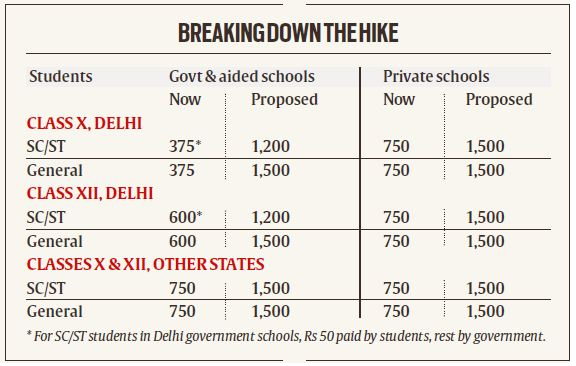Explained: How CBSE fee hike is different in Delhi and other states, why the protests
Explained: How CBSE fee hike is different in Delhi and other states, why the protestson Aug 21, 2019

With the hike put in place this year, the fee has increased to Rs 1,500 for all students except SC and ST students of Delhi government schools, in whose case the fee has increased to Rs 1,200.
Earlier this month, the Central Board of Secondary Education (CBSE) sent out a circular to the heads of all schools affiliated to it, giving directives for the submission of lists of students who will be appearing for the classes X and XII board examinations in 2020. The directives for the collection of examination fees from the candidates showed that these have been doubled for all students. In the case of Delhi government school students in class X, the hike is even steeper — an increase of 3.2 times for students belonging to the Scheduled Castes and Scheduled Tribes categories, and of 4 times for the rest. The move has led to opposition from the state governments in Delhi as well as Odisha. The hike Until last year, students across all states appearing for both the class X and the class XII examinations had to pay Rs 750 as the examination fee for five subjects, with an additional Rs 300 for each extra subject they might have opted for. The only exception was in the case of the students of Delhi government schools. Here, the fees were Rs 375 for class X candidates and Rs 600 for class XII candidates. Over and above this, through a special arrangement of the Delhi government with the Board, SC/ST students of both classes were required to pay only Rs 50 on their own, with the rest paid by the Delhi government to the board — Rs 325 per student in for class X, and Rs 550 per student for class XII. With the hike put in place this year, the fee has increased to Rs 1,500 for all students except SC and ST students of Delhi government schools, in whose case the fee has increased to Rs 1,200. Why hike fees According to a CBSE official, one of the primary reasons was the loss of a large source of its revenue with the setting up of the National Testing Agency in 2018. “The CBSE is a self-funded organisation and needs to create its own resources. There is no budgetary allocation towards it. It is used to generate the greater share of its revenue through the fees of a number of public examinations it used to conduct such as the National Eligibility cum Entrance Test (NEET), National Eligibility Test (NET), and Joint Entrance Examination — Main (JEE Main). With these being transferred to the NTA, this source has been lost even as the board is running with a deficit in its finances of Rs 200 crore,” said the official. The last time the CBSE increased its examination fees was five years ago. According to officials, since then the costs of conducting examinations has been increasing because of efforts to make it more efficient. Among the causes for increased costs cited by the CBSE are the introduction of one lakh new evaluators and invigilators for each day of the examination this year, the introduction of 5,000 new observers and 5,000 new superintendents, an increase in the honorarium of evaluators by 33 per cent, and face-to-face training of of 2.5 lakh evaluators. The Board had also introduced a number of technological interventions this year to prevent paper leaks like in 2018. These include a “Confidential Material Tracking and Monitoring (CMTM)” app for supervisors through which they had to send geo-tagged and time-tagged photos of three stages of the exam day process — opening the question paper packets, distribution of question papers, and sealing of answer-script packets. Opposition in Delhi… The Delhi government threatened to form its own Board, stating that the decision to increase the fee was “arbitrary” and taken without taking into consideration the government’s opposition to it. There are more than 1,000 schools run by the Delhi government, all affiliated to the CBSE. Schools run by various state governments almost all follow their respective state education boards. Delhi, like other Union Territories, follows the CBSE in its government schools, and it is the UT with the largest number of government-run schools. Apart from this, the largest number of CBSE-affiliated schools are private schools and central government schools. Because of this, the Delhi government has claimed to be the “largest partner” of the CBSE and opposed the fee hike. Following its opposition, the CBSE announced that it will restore the previous arrangement of SC/ST students of their schools paying only Rs 50, with the Delhi government paying the remaining Rs 1,150. The Delhi government has also promised that it will pay the entire examination fee for all its students; however, no such directive has been issued to schools so far. And in Odisha Odisha Chief Minister Naveen Patnaik has written to Union HRD Minister Ramesh Pokhriyal asking that the decision be reconsidered. “You may know that Odisha Government has opened more than 200 English Medium Model Schools affiliated to CBSE in rural areas for the benefit of economically and socially under-privileged sections of the society. This decision is bound to result in acute hardship to them,” Patnaik wrote. However, the CBSE has not announced any special arrangement for students in any state other than Delhi.
Cbse
Cbse fee
Delhi government
English medium model schools
Jee main
Minister
Neet
Odisha chief minister
Opposition in delhi
Sent out a circular

.jpg)
.jpg)
.jpg)
.jpg)
.jpg)

.jpg)
.jpg)
.jpg)
.jpg)
.jpg)

.jpg)
.jpg)
.jpg)



Sorry! No comment found for this post.